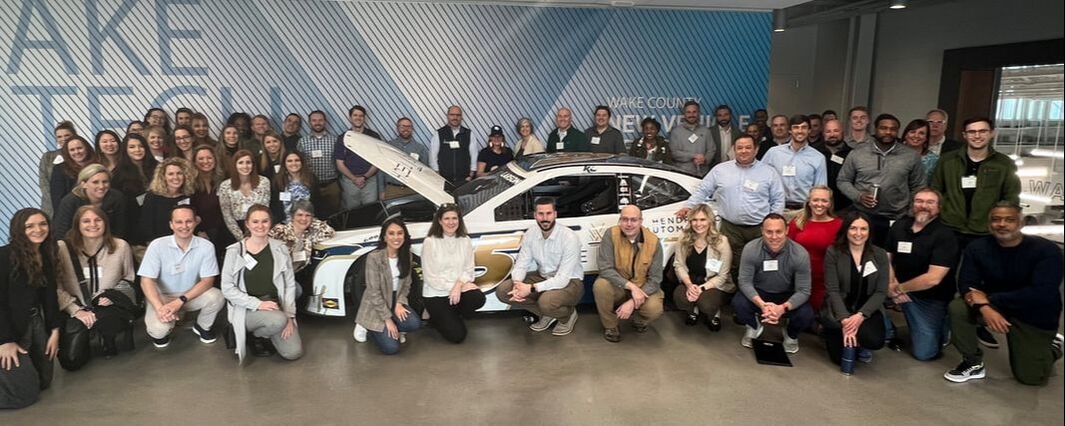|
Small business leaders and organizers from around the region came together last week for the Chamber's first Triangle Small Business Resource Collaboration Meeting. This quarterly round table will help us learn more about what the community needs, identify areas where the Chamber can be of service, and enable us to collaborate and share resources with the small business community. Participants Include: Small Business Development Team, City of Raleigh Mark Weldon, Small Business Economic Development Leader Carl Brooks, Small Business Development Coordinator Ferdinand Rouse, Small Business Development Coordinator Hanna Hemphill, Small Business & Workforce Development Carolina Small Business Development Fund Kevin Dick, President, and Chief Executive Officer Lori Diaz, VP of Business Solutions Ellysa Smith, Human Resource Director The Wright Village Mel Wright, Founder and CEO Black Dollar NC Johnny Hackett, Jr., Chief Executive Officer at The Black Dollar Corp. Wake Tech Small Business Chris Weeks, Director of Entrepreneurship Minority Women Business Enterprise, City of Raleigh Lakesha Shaw MWBE Program Manager Alisha Puckett, MWBE Coordinator Maria Torres, MWBE Coordinator U.S. Small Business Association Eileen Joyce, Lead Economic Development Specialist US Small Business Administration Raleigh Chamber of Commerce Janet Potter, General Manager/Senior Vice President Marc Dinitz, Vice President of Marketing and Communications Dr. Torri A. Staton, Vice President of Diversity, Equity & Inclusivity, Raleigh Chamber Director of Equitable Economic Development, Wake County Economic Development Serenia Parsons, Diversity, Equity & Inclusivity Program Coordinator Mary Kubeny, Content Manager Jackie Huitt, Vice President of Membership Shanita Robinson, Membership Engagement Director Save the Date for Triangle Small Business Week 2023: April 30 - May 6
0 Comments
Written by: Sloane Heffernan Leadership Raleigh Class 46 The February class day, sponsored by Brasfield & Gorrie, was focused on education and talent in our thriving community. Raleigh consistently tops national lists of best places to live, work, and play. With more companies and jobs coming to the Triangle, it will be crucial to have a skilled workforce - and that begins with education. The class began with a panel and tour of The Alice Aycock Poe Center for Health Education. The mission of the Poe Center for Health Education is to educate and empower North Carolina children, youth, and their families to make choices that increase positive health behaviors. The panel focused on School Community Partnerships and included speakers from the Boys & Girls Club of Wake County, WakeEd Partnership, Communities in Schools of Wake County, District C, and a District Career Development Specialist from Wake County Public Schools. The panel discussed the challenges facing our children today, and the necessary skills they will need to be successful in the future. They also shared the importance of teaching “durable” skills (ie: critical thinking, collaboration, sourcing different ideas) to create value for businesses. We were reminded that it takes a village when Heather Brosz White, Director of Government Foundation for the Boys and Girls Club said, “We need to take responsibility for our county’s children.” Our next stop was the Hendrick Center for Automotive Excellence at Wake Tech. The state-of-the-art facility that opened last year allows the college to triple the number of students in it’s automotive systems technology program and add a new degree program in collision repair. They are also launching a program for Electric Vehicles. The panel discussed Building Tomorrow’s Talent Pipeline. It’s been said that the road to job opportunity runs through Wake Tech. We learned that 75% of Wake Tech students are from Wake County, and the average age of a student is between 26 and 27 years old. We also learned about the WakeWorks Apprenticeship Program where students attend Wake Tech for free, get a paid apprenticeship, and typically land a job when the program is done. Dr. Scott Ralls, President of Wake Tech, said 93% of apprenticeship program participants stay in their roles three to five years post program completion. Our final stop of the day was at NC State’s newly redesigned Talley Center, for a panel about The Business & Politics of Public Education. We learned about the history of the public school system and how local and state lawmakers work together to shape policy and budgets for education. Key takeaways from the experiences this month are focused on two items 1) Education Challenges and 2) Workforce Development. Educational Challenges There are limited resources and competing demands in public education. Teacher pay, recruitment, and retention were brought up as big concerns. We learned that while 90% of public school expenditures are spent on teacher salaries and benefits, our teachers are still paid below the national average but a raise of just one percent would cost $60 million. North Carolina has received about $6 billion in Covid Relief Funds for public education and it is still unclear how the money will be spent. Workforce Development It’s exciting to hear the news of companies coming and expanding in the Triangle. How do we fill those jobs with people who already call North Carolina home? Whether it is a tech job or a trade job, there are big opportunities on the horizon. Education and a talented workforce will be key factors to driving future success for our community. Record a short video on your phone telling us who your favorite Black historical figure is and why. After you record, simply drop your file in this link.
|
AuthorGreater Raleigh Chamber of Commerce Archives
July 2024
Categories
All
|
|
Greater Raleigh Chamber of Commerce
800 S. Salisbury St. Raleigh, NC 27601 |





 RSS Feed
RSS Feed